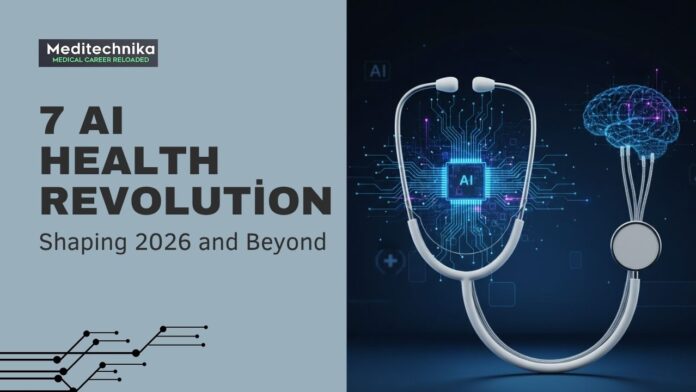AI in Healthcare: 7 Transformations Shaping 2026 and Beyond
From diagnosing diseases to decoding ancient medical wisdom, AI in healthcare is reshaping the future of global health. Imagine a world where your doctor’s assistant isn’t human, but a smarter, faster, and always-available version powered by artificial intelligence. That world is no longer a fictional story. With 4.5 billion people still struggling to access healthcare services and a projected global shortage of nearly 11 million healthcare workers by 2030, AI in healthcare could be the transformative force that bridges this critical gap.
AI is not just changing how we treat patients; it is also redefining how healthcare works, learns, and saves lives. While the finance and retail industries have already embraced AI, healthcare is just beginning to unlock its full potential. Yet, the breakthroughs we’re already seeing are nothing short of revolutionary.
Here are seven powerful ways AI is transforming healthcare in 2025 – from operating rooms to rural clinics and even ancient traditions.
-
AI in Healthcare: Smarter Brain Scans That Save Time – and Lives
AI is now performing very well in the medical field at detecting brain abnormalities. In the UK, a new AI system trained on thousands of brain scans was found to be twice as effective as human experts at identifying strokes and estimating their onset time, a critical factor that determines treatment success.
“Every minute counts in stroke care,” says neurologist Dr. Paul Bentley. AI helps us to determine not only if the stroke occurred but also when it did so, which makes the difference between recovery and permanent disability.
-
Spotting Fractures Humans Miss
Even the best doctors can miss subtle bone fractures on X-rays – up to 10% of the time, according to studies. AI tools trained on millions of images are now catching what humans can’t.
The UK’s National Institute for Health and Care Excellence (NICE) calls these tools “safe and reliable”, and they may help cut down on needless X-rays and regular follow-up appointments. And the outcome of it? Lesser stress on already burdened clinicians, faster care, and fewer mistakes, too.
-
AI in Healthcare: Predicting Diseases Before Symptoms Appear
What if your future health risks could be spotted years before symptoms show up?
AI models developed by AstraZeneca and UK researchers can now predict over 1,000 diseases in advance, including Alzheimer’s and kidney disorders, simply by analysing patterns in health data.
“We can now detect early signatures of disease long before a patient feels unwell,” says Slavé Petrovski, one of the lead researchers. “This could transform how we prevent, not just treat, illness.”
-
AI-Powered Ambulance Decisions
Emergency response is all about speed and judgment. In northern England, researchers trained an AI system to analyze patient data – pulse, oxygen levels, mobility, and pain – and found it could accurately predict who needed to go to the hospital in 80% of cases.
For overburdened paramedics and packed hospitals, this means smarter triaging and better use of limited resources – without compromising care quality.
-
AI in Healthcare – Chatbots That Help (But Don’t Replace) Doctors
Virtual assistants and AI chatbots are becoming more and more integrated into the healthcare team. Next-generation systems like ChatRWD, which combine large language models with real-time data retrieval, now provide clinically useful answers five times more frequently than earlier AI tools, whereas early chatbots had accuracy issues.
Patient engagement is also changing as a result of digital health platforms like Huma. They have contributed to a 30% decrease in hospital readmissions and a 40% reduction in time spent on patient reviews. The future? AI-driven user interfaces that help patients at every stage, from follow-up to self-diagnosis.
-
Blending AI with Ancient Healing Traditions
AI is not only improving contemporary medicine; it is also helping preserve and modernize traditional healing practices used by billions of people worldwide.
India’s Traditional Knowledge Digital Library is using AI to catalogue Ayurvedic texts and identify herbal remedies for treating contemporary illnesses. AI is being used in South Korea to analyze herbal compounds for treating blood disorders and in Ghana to help identify medicinal plants.
The World Health Organization estimates that by 2025, this combination of technology and tradition could drive a $600 billion market for traditional medicine while ensuring that indigenous communities remain innovators and collaborators.
-
Cutting the Admin to Let Doctors Be Doctors
The silent burden of healthcare is paperwork. Documentation takes up most of a doctor’s time. AI can change that.
Clinical notes and summaries are being automated by programs like Google’s MedLM and Microsoft’s Dragon Copilot. Testing and diagnosis times in Germany have been shortened from many weeks of work to hours, thanks to the AI platform Elea.
“No one joins healthcare to spend hours on admin,” says Dr. Sebastian Casu, co-founder of Elea. AI frees up our time to care.
The Road Ahead: Innovation with Integrity
While AI’s promise is enormous, its risks can’t be ignored. Privacy, bias, and misinformation remain critical challenges. Both the FDA in the US and the UK’s MHRA are now tightening regulations to ensure these technologies are safe, transparent, and trustworthy.
AI won’t replace doctors – but it’s redefining what doctors can do.
From the emergency room to ancient medicine, artificial intelligence is becoming healthcare’s most transformative ally – helping humanity heal faster, smarter, and more fairly than ever before.






